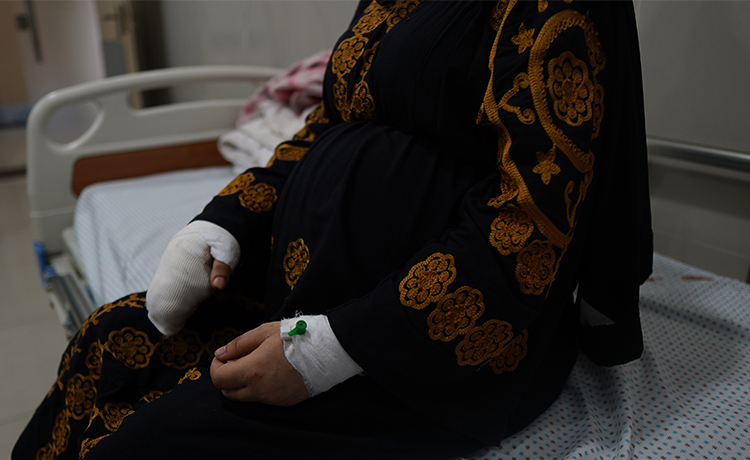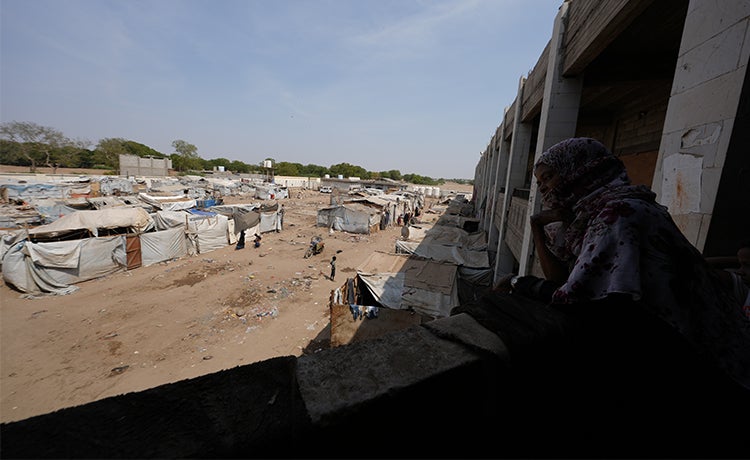News
$1.2 billion needed in urgent UNFPA appeal for women’s and girls’ sexual and reproductive health and rights in 2024
- 12 December 2023
News
UNITED NATIONS, New York – This year saw records toppled one after the other: The hottest year in human history; the highest number of people displaced; hunger crises at their worst.
With these broken thresholds comes a grim new tipping point: One in every 22 people in the world now needs humanitarian support, while the global humanitarian system faces its severest funding shortfall in years.
To support some of the world’s most vulnerable populations, UNFPA, the United Nations sexual and reproductive health agency, today launched its annual humanitarian appeal. An urgent call for ramped-up delivery of life-saving reproductive health services and programmes to prevent gender-based violence, the appeal covers 58 countries and 48 million people.
The highest funding needs are in Afghanistan, where a staggering $216 million is required. Years of conflict, poverty, political instability and now recurrent drought have undone decades of progress – particularly for the rights of women and girls – and two thirds of the population need humanitarian assistance.
Exacerbating the situation, in early October a 6.3-magnitude earthquake struck western regions of the country, killing and wounding thousands and wiping out health facilities in already underserved and hard-to-access areas.
Sediqa Karimi, a midwife with a UNFPA-supported mobile health team, was immediately deployed to assist women in the village of Naeb Rafi. “Witnessing the suffering of children and women in their final moments left me traumatized,” she said.
Afghanistan is one of the world’s most dangerous countries to give birth, with one woman dying every two hours during pregnancy or delivery. For many, UNFPA’s network of family health houses and community midwives provide the only health-care services available in remote regions.
“Our presence is a source of comfort and reassurance for these women in need,” said Ms. Karimi.

Needs don’t stop in a crisis
As of September, an unprecedented 114 million people across the world had been forcibly displaced from their homes.
“When crisis strikes, women and girls pay the steepest price,” said UNFPA Executive Director Dr. Natalia Kanem.
“Unless we put them front and centre in our humanitarian response, we will see more gender-based violence, more child marriage, and more pregnancy and childbirth-related deaths.
In Gaza, 35-year-old Walaa waited to see a doctor at the Al-Hilo hospital with a fracture in her skull and her right hand. “I am in my ninth month, I could give birth any moment now,” she told UNFPA. “Of course I’m afraid to deliver amid war… Nothing is safe. Even hospitals are not safe.”
There are an estimated 50,000 pregnant women currently in Gaza, with scarce access to reproductive health care, enough food to eat or a safe place to stay.
In Yemen, nearly half of all health facilities have closed since the conflict escalated; UNFPA is the only organization providing life-saving reproductive health services in hospitals, at camps for internally displaced people and through mobile clinics. Now with repeated cycles of drought and flooding, the climate crisis is rapidly multiplying the risks women and girls face.
Kholoud, 28, trained as a midwife in Yemen’s Ibb governorate. “I thought being a midwife would give me the freedom to help and guide other women to have fulfilling lives,” she told UNFPA.
She had given up on her dreams after suffering years of abuse at the hands of her husband. That was until she sought shelter at a UNFPA safe space for women and girls, where she received counselling, health care and legal support to get divorced and claim custody of her children.
“When you lose all hope and the will to live, then suddenly relief comes to you… this is how the mental health centre saved me,” Kholoud said. “I am finally free from exploitation, abuse and exhaustion.”

Escalating vulnerabilities
Recent UNFPA data show that countries most vulnerable to climate change also have some of the highest maternal death and child marriage rates, and among the most chronic levels of gender-based violence.
Over the next decade, climate and conflict will likely force more women and girls to move in search of safety and shelter, increasing their exposure to violence: UNFPA estimates that in 2024 more than 6 million pregnant women will need critical humanitarian assistance and some 84 million women and girls risk facing gender-based violence.
Since conflict broke out in Sudan in mid-April this year, medical facilities have shuttered and access to protection services and deliveries of critical supplies have been severely compromised.
“In one month we lost six women during labour in the hospital I work for because of shortages of Oxytocin,” said one doctor, who preferred not to be named. “It's really sad to see women die because of shortages of medicine. The happiness of a lot of families turned into an endless sorrow because of that.”
UNFPA is shipping this and other haemorrhage-treating medicines to Sudan, a lifeline for over 500,000 women who during pregnancy and childbirth are at risk of uncontrolled bleeding, the leading cause of maternal deaths in the country.
People in crisis cannot be forgotten
Some 25 million more people require assistance today than at the start of 2023, yet the gap between needs and funding is only widening: UNFPA's humanitarian programmes were just 50 per cent funded this year, with responses to gender-based violence one of the most neglected sectors.
Nonetheless, this year UNFPA served over 10 million people in the most demanding emergencies, providing reproductive health services and protection against gender-based violence for 4.2 million.
“Together we are working for a world where, whatever the crisis, protecting the health, safety, and rights of women and girls is priority number one,” added Dr. Kanem. “This is the foundation for the peace, justice and security that they – and the world – so desperately need.”